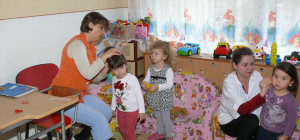 You may be dedicated to nursing your patients back to good health, but nurses themselves have to take care of their health, especially when flu season hits. Of course, washing your hands often and avoiding coming in contact with germs works well to avoid becoming infected with the flu or coming down with the common cold, but healthcare professionals enrolled in pediatric nurse college just aren’t going to be able to stay away from germs altogether. So put on your facemask and keep it on this winter, and a take these four extra precautions in order to lower your risk of having your health compromised as a nurse actively working in the medical field.
You may be dedicated to nursing your patients back to good health, but nurses themselves have to take care of their health, especially when flu season hits. Of course, washing your hands often and avoiding coming in contact with germs works well to avoid becoming infected with the flu or coming down with the common cold, but healthcare professionals enrolled in pediatric nurse college just aren’t going to be able to stay away from germs altogether. So put on your facemask and keep it on this winter, and a take these four extra precautions in order to lower your risk of having your health compromised as a nurse actively working in the medical field.
1. Spray Everything with Disinfectant Spray
Okay, so you don’t want to asphyxiate yourself with disinfectant spray, but you want to kill harmful germs pretty indiscriminately. From doorknobs to hardcover books, germs carrying disease and illness can be lurking anywhere. As long as the material is safe to spray with disinfectant, you can spray and spray until your heart’s content. Open the window if you are going to be spraying a large surface or a number of items so that the area stays well ventilated, and avoid spraying disinfectant around your face and eyes.
2. Use Hand Sanitizer Liberally
As a nurse you may wear latex gloves continuously almost your entire shift, but it is during the time that your hands remain bare that you should be especially careful. Just touching your steering wheel with contaminated hands can cause harmful germs to spread to your home, putting your family at risk. Those taking pediatric nurse practitioner programs online have to go the extra mile, knowing that they will soon be working with sick children who have vulnerable immune systems. Get used to using enough hand sanitizer so that germs stay away, but not so much as to dry your hands and lead to cracking of the skin.
3. Keep Your Face Covered
When sick people cough, they send a huge cloud of germs radiating into the environment. Airborne illnesses are spread quickly during the winter as more people stay indoors and congregate together. In the healthcare field, contagious diseases are spread primarily through touching infected surfaces and breathing in cold and flu causing germs directly into the airway. If you keep a facemask on as you work with patients, you won’t get sick nearly as often.
4. Change Your Clothes as Soon as You Get Home
Germs might like to hitch a ride home on your hands or attack your immune system by getting into your mouth or throat, but they can also be present on your clothes. Maintaining a separate hamper for work clothes and scrubs that you wear in healthcare facilities can help to prevent germs from spreading throughout your home. You should also use disinfectant spray around any areas that your work gear is stored, so germs don’t have a chance to increase their population or accidentally be transported to the bedroom, living area or bathrooms.
If you’re a nurse, you really don’t want to get sick. Not only do you have to take off time from work to get well, but you can also infect your patients by accident. Take these simple precautions to stay healthy and strong so you can care for your patients this winter season.







